I hate Kaidan Alenko, but that's okay
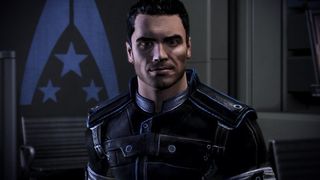
Saren tried to wipe out the galaxy. The geth shot more lasers and rockets at me than I could count. They weren't that bad, really. But Kaidan? That guy's the worst .
Let me explain. It's not like Kaidan was a bad squadmate. He could be the most nuanced character in the entire Mass Effect universe, for all I know. The guy seemed fine, really. Until he opened his mouth.
I'd recognize that voice anywhere. When Kaidan started speaking on Eden Prime, I didn't hear the voice of an Alliance-trained Biotic. I heard the smarmy reproaches of Carth Onasi, goody two-shoes hero of the Galactic Republic. It was a voice I had learned to despise while abusing the Dark Side in BioWare's Knights of the Old Republic. Carth was the voice of empathy, usually—a voice I didn't need to hear while Force-choking the innocent and blackmailing aliens into handing over their meager life savings.
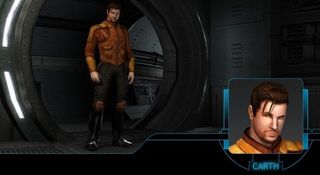
There I was, fifteen minutes into Mass Effect, and BioWare had already thrown a voice I despised right into my ears. He was in my squad! It was a waking nightmare. I stuck out the opening mission and spent the rest of Mass Effect paying as little attention to Kaidan as possible. And then I spent the next four years thinking of Kaidan Alenko as little as possible. It wasn't until Mass Effect 3 arrived that I realized how incredible that is—because I killed Kaidan, and he still matters.
BioWare struck gold with the personalization of Commander Shepard, as evidenced by the Internet's reaction to every Mass Effect screenshot out there ("That's not what Shepard looks like! Shepard looks like this!"). Mass Effect takes one interpretation of the "role" in role-playing game to its logical extreme, cultivating an unusually fierce bond between player and avatar.
The way the entire Mass Effect saga handles player choice is ultimately a greater achievement, at least from a technical perspective. Dozens of minute decisions carry over from Mass Effect to Mass Effect 2 to Mass Effect 3—yet Kaidan dwarfs them all.
Think of it this way: voice actor Raphael Sbarge has dedicated several months out of the past half-decade recording dialogue for the Mass Effect trilogy. Writers at BioWare have dedicated even more time to creating that dialogue, assuring that Kaidan gets his share of unique dialogue. Artists and animators devoted dozens of hours to Kaidan's armor and movements and character expressions in each game.
PC Gamer Newsletter
Sign up to get the best content of the week, and great gaming deals, as picked by the editors.
I didn't care about any of that. While playing Mass Effect, I said to myself, "Man, I hate that guy." And BioWare responded with "You know what? That's okay."
In Jane Shepard's world, Kaidan's been dead for more than four years. He was never promoted from Staff Lieutenant to Staff Commander because I sacrificed him on Virmire. Actually, "sacrificed" isn't the right word. I left him to die, gleefully, elation triggering a reaction in my head that went something like this: "Yes yes yes yes yes yes yes yes."
I might have done a little dance.
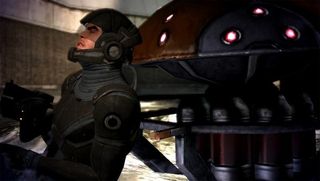
If my trusty shotgun hadn't been equipped with sledgehammer rounds that sent even the mightiest of Krogan warlords ragdolling into walls, killing Kaidan would've easily been my fondest memory of Mass Effect.
But that doesn't make Kaidan a bad character. Video game characters usually earn my scorn through shoddy storytelling or dialogue: I can't stand the legions of Japanese characters like Final Fantasy VIII's Squall Leonhart, who lean far too heavily on the the Japanese tsundere archetype of aloof hostility.
Kaidan, on the other hand, fits the definition of a well-developed character. He has a complex backstory and traits that cast him as the most virtuous of the Normandy's crew (much like KotOR's Carth Onasi). Ironically, good characterization is what makes me hate Kaidan. BioWare nailed one of the key aspects of character development laid out in Jesse Schell's The Art of Game Design: using the power of the voice.
As Schell writes, "the voice acting in games seems primitive compared to the powerful performances in film...Because the process of game development is so volatile, it is expensive to create characters around their voices."
Mass Effect often suffers from stiff or wonky animation, but the series sets a high bar for interactive dialogue and voice acting, which games like L.A. Noire have built on with extensive motion capture. And Kaidan's voice fits his character perfectly, which is why I really can't stand him. He's just too damn genial. Evoking such a strong reaction—even a negative one—makes Kaidan an unusually memorable cog in the complex machine of Mass Effect's narrative, considering I spent less than thirty minutes interacting with him.
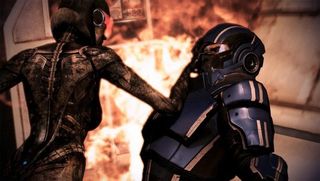
BioWare facilitated my hatred for Kaidan by letting me kill him, and that decision has a huge impact on Mass Effect 3. By importing my Shepard, I intentionally shut off access to a squad member, his unique dialogue and role in the game's plot. A choice I made as a sophomore in college still affects me now, four years later. I don't live in the same state, or have the same job, or even play on the same platform I once did, but Kaidan Alenko is still dead.
The way BioWare embraced that player decision created a permanence in the Mass Effect world that really doesn't exist elsewhere in gaming.
But Mass Effect's critical moments fall victim to one of interactive storytelling's most common problems, laid out in The Art of Game Design: "time travel makes tragedy obsolete." Schell writes:
"Freedom and control are one of the most exciting parts of any interactive story, but they come at a terrible price: the storyteller must give up inevitability. In a powerful tragic story, there is a moment where you see the horrible thing that is going to happen, and you feel yourself wishing, begging, and hoping that it won't. ... This rush of being carried along toward certain doom is something that videogame stories simply cannot support, for it is as if every protagonist has a time machine, and anything seriously bad that happens can always be undone."
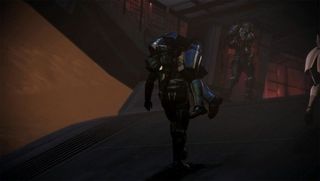
With enough Paragon or Renegade points, nearly every disaster in the Mass Effect series can be avoided, and gamers react so strongly to those moments they'll load an earlier save ("time travel") just to make a different decision. It's a natural reaction, but the sacrifice on Virmire avoids that trap through a forced binary choice between Kaidan and Ashley. Is that the most sophisticated form of interactive storytelling? No—but BioWare makes up for that by carrying the repercussions of Kaidan's death throughout the entire trilogy. Kaidan and Ashley's character arcs may be interchangeable in Mass Effect 3, but I can think of one pivotal scene that I would've handled very, very differently were Kaidan still alive.
And that's awesome. I've replayed games to fully explore content I missed the first time around. I've devoted hours to the GDI, NOD, Axis and Allied campaigns of Command & Conquer. I've blasted my way through thousands of Las Plagas in Resident Evil 4 to revel in the brain-splatting power of decked out magnums and shotguns. But I'll never create a new character in Mass Effect 3 just to see Kaidan alive again.
Partly because I hate him; primarily because BioWare let my choice matter, and as a result I felt like less of a content consumer and more of a collaborator in their storytelling. That's an accomplishment BioWare can't destroy, no matter how they modify or expand Mass Effect 3's ending . Mass Effect 3 delivers resolution for returning characters both major and marginal, but the relationship between Shepard and Ashley (or Kaidan) feels especially important from the outset. Closing or widening the gap that opened between you during Mass Effect 2 leads to a defining moment for both characters.
Killing Kaidan on Virmire and carrying that decision through the Mass Effect trilogy is a landmark moment for interactive storytelling. And so is saving him. But why would you do that?

Wes has been covering games and hardware for more than 10 years, first at tech sites like The Wirecutter and Tested before joining the PC Gamer team in 2014. Wes plays a little bit of everything, but he'll always jump at the chance to cover emulation and Japanese games.
When he's not obsessively optimizing and re-optimizing a tangle of conveyor belts in Satisfactory (it's really becoming a problem), he's probably playing a 20-year-old Final Fantasy or some opaque ASCII roguelike. With a focus on writing and editing features, he seeks out personal stories and in-depth histories from the corners of PC gaming and its niche communities. 50% pizza by volume (deep dish, to be specific).
Most Popular






